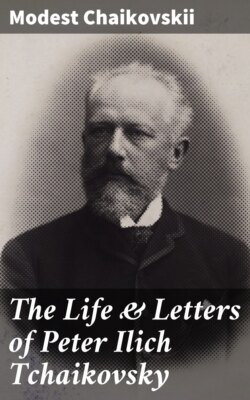Читать книгу The Life & Letters of Peter Ilich Tchaikovsky - Chaikovskii Modest - Страница 25
На сайте Литреса книга снята с продажи.
ОглавлениеTo A. and M. Tchaikovsky.
“Moscow, April 7th (19th).
“Brothers! Forgive me for not having written before. The journey was safely accomplished. The news of the attempt upon the Emperor’s life reached us at the station where we stopped for tea, but only in a very vague form.[15] We pictured to ourselves that he was actually dead, and one lady wept bitterly, while another began to extol all the virtues of the new sovereign. Only at Moscow I learnt the true account. The rejoicings here were beyond belief; yesterday at the Opera, where I went to hear A Life for the Tsar, when the Poles appeared on the stage the entire public began to shout, ‘Down with the Poles!’ In the last scene of the fourth act, in which the Poles put Sousanin to death, the singer who was taking this part resisted with such realistic violence that he knocked down several of the ‘Polish’ chorus-singers. When the rest of the ‘Poles’ saw that this outrage to art and to the truth delighted the public, they promptly fell down of their own accord, and the triumphant Sousanin walked away, shaking his fists at them, amid the vociferous applause of the Muscovites. At the end of the opera the Emperor’s portrait was brought on the stage, and an indescribable tumult followed.”
To Alexandra Davidov.
“April 18th (20th).
“I am going to act as advocate for two mortals who are just crazy about Kamenka. You write that Toly and Modi might be left in Petersburg, but I am determined not to tell them your point of view. They would utterly lose heart—especially Toly. One of my chief reasons for caring to spend the summer at Kamenka is to be with them, and your house is the only place where we can be together for a time. If you only knew how these little fellows cling to me (and I return their love a hundredfold), you would not find it in your heart to separate us. Arrange, my dear, for this visit to come off. Very likely I shall be able to take part of the expense off your hands.”
Before the summer holidays came, Tchaikovsky’s health was in an unsatisfactory condition. He complains in his letters of insomnia, nervousness, and the throbbing sensations in his head, to which he often refers as “my apoplectic symptoms.” At the end of April his depression became very apparent, and he wrote to his brother Anatol:—
“My nerves are altogether shaken. The causes are: (1) the symphony, which does not sound satisfactory; (2) Rubinstein and Tarnovsky have discovered that I am easily startled, and amuse themselves by giving me all manner of shocks all day long; (3) I cannot shake off the conviction that I shall not live long, and shall leave my symphony unfinished. I long for the summer and for Kamenka as for the Promised Land, and hope to find rest and peace, and to forget all my troubles there. Yesterday I determined to touch no more wine, spirits, or strong tea.
“I hate mankind in the mass, and I should be delighted to retire into some wilderness with very few inhabitants. I have already secured my ticket in the diligence for May 10th (22nd).”
The visit to Kamenka, to which he had looked forward through the winter and spring, did not actually come to pass. In consequence of the state of the high-roads, the diligence was unable to run beyond Dovsk; the remainder of the journey had to be undertaken, at the traveller’s own risk and expense, in a private post-chaise. Tchaikovsky’s funds did not permit of this extra strain, and the visit to his sister was abandoned. With the assistance of his father, Anatol was sent to Kamenka, while Peter Ilich, with Modeste, went for a time to his sister’s mother-in-law at Miatlev, near Petersburg.
In spite of the beauty of scenery and his pleasure in being with his excellent friends, Elizabeth and Vera Davidov, in spite of being near his father and the poetical impression derived from a trip to Lake Ladoga, Tchaikovsky did not altogether enjoy his holiday at Miatlev. The cause of this was his G minor symphony, afterwards known as Winter Day Dreams. Not one of his compositions gave him so much trouble as this symphony.
He began this work in Moscow during the spring, and it was the cause of his nervous disorders and numerous sleepless nights. These difficulties were partly caused by his want of experience in composition, and partly by his habit of working by night as well as by day. At the end of June he had a terrible nervous breakdown, and the doctor who was called in to see him declared he had narrowly escaped madness, and that his condition was very serious. The most alarming symptoms of the illness were his hallucinations and a constant feeling of dread. That he suffered intensely is evident from the fact that he never again attempted to work through the night.
In consequence of his illness, Tchaikovsky was unable to finish the symphony during the summer. Nevertheless, before his return to Moscow he resolved to submit it to his former masters, Anton Rubinstein and Zaremba, hoping they might offer to let it be heard at the Musical Society.
Once more he was doomed to disappointment. His symphony was severely criticised, rejected, and pronounced unworthy of performance. It was the first completely independent work which he had composed after leaving the Petersburg Conservatoire. The only other work upon which he was engaged at this time was the orchestration of his F major and C minor overtures, which still remain unpublished.
